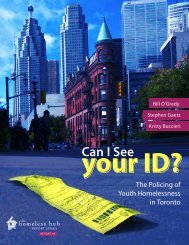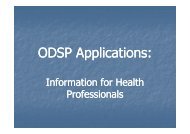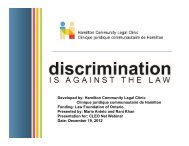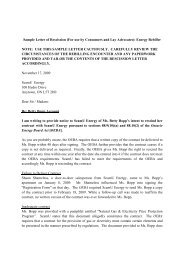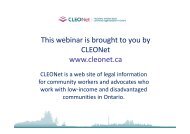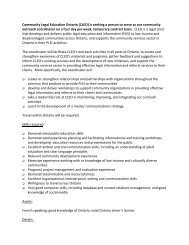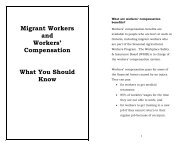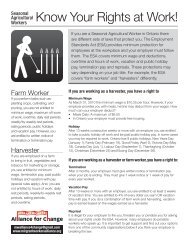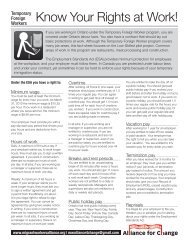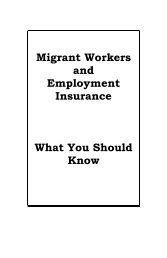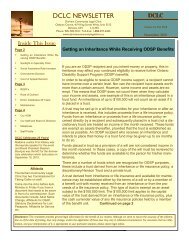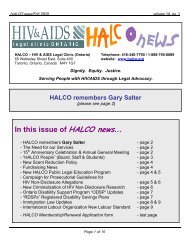Canadian Centre for Elder Law A Practical ... - Your Legal Rights
Canadian Centre for Elder Law A Practical ... - Your Legal Rights
Canadian Centre for Elder Law A Practical ... - Your Legal Rights
Create successful ePaper yourself
Turn your PDF publications into a flip-book with our unique Google optimized e-Paper software.
!(b) an intentional, reckless or threatened act or omission that causes bodily harm ordamage to property;(c) an intentional, reckless or threatened act or omission that causes a reasonablefear of bodily harm or damage to property;(d) <strong>for</strong>cible physical confinement without lawful authority;(e) sexual assault, sexual exploitation or sexual molestation, or the threat of sexualassault, sexual exploitation or sexual molestation;(f) conduct that causes the applicant to reasonably fear <strong>for</strong> his or her safety,including following, contacting, communicating with, observing or recording a person;and(g) the deprivation of food, clothing, medical attention, shelter, transportation orother necessaries of life.5. <strong>Elder</strong> Abuse and Neglect in the WorkplaceNo action may be brought against a person who makes a report about a neglected adult,unless the report was made maliciously or without reasonable cause (Neglected AdultsWelfare Act, s. 4(2)).6. Confidential In<strong>for</strong>mationProfessionals, non-professional staff and volunteers must normally get consent from anolder adult be<strong>for</strong>e disclosing personal or health in<strong>for</strong>mation.The Neglected Adults Welfare Act (s. 4(1)) states that a person must discloseconfidential or privileged in<strong>for</strong>mation, regardless of the consent of the neglected adult,pursuant to the obligation to report neglect to the Director of Neglected Adults or asocial worker.Disclosure of confidential health in<strong>for</strong>mation is permitted under the Personal HealthIn<strong>for</strong>mation Act (s. 40(1)(a)) “to prevent or reduce the risk of serious harm to themental or physical health or safety of the individual the in<strong>for</strong>mation is about or anotherindividual” or where disclosure is required by another law (s. 43).The AIPPA applies to public bodies, defined broadly to include health care bodies andmunicipal government. This law permits disclosure without consent under a number ofcircumstances including:• <strong>for</strong> the purposes of complying with another law,• assisting with a police investigation, or• where the head of the public body determines that compelling circumstancesexist that affect a person’s health or safety and where notice of disclosure ismailed to the last known address of the individual the in<strong>for</strong>mation is about (s.39(1)(d),(n),(o) and (p)).The Federal Act applies to private organizations like private care facilities. It permitsdisclosure where required by a law (s. 7(3)(i)) and under the following circumstancesthat might apply to elder abuse:Disclosure is made to a person who needs the in<strong>for</strong>mation because of an emergencythat threatens the life, health or security of an individual and, if the individual whom! "#!




